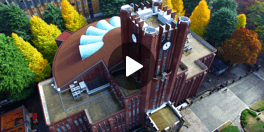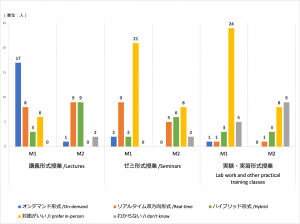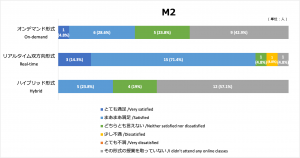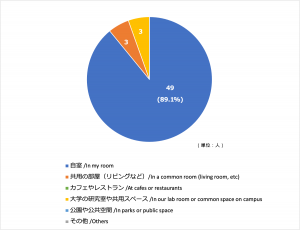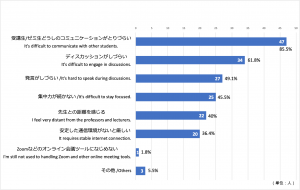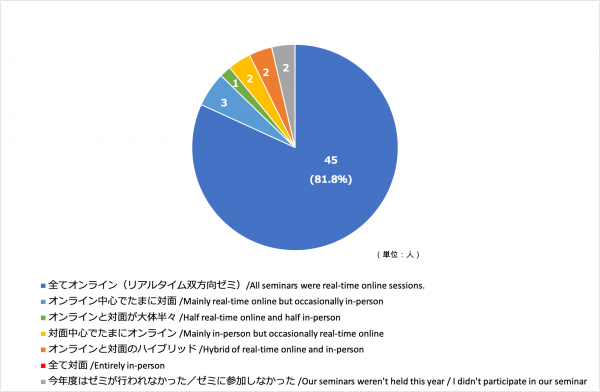
March 31, 2021
「M1&M2に聞く『コロナ禍の学府生活』」アンケート結果(前編)"Life as a master's student at GSII during the COVID-19 pandemic" survey results (Part 1)
新型コロナウイルス感染症(COVID-19)の感染拡大が始まって1年が経ちましたが、先がまだ見通せないうちに2020年度が終わります。このパンデミックは学環・学府の構成員にとってもいろんな形で影響を及ぼしていますが、学環・学府ニューズレター&ウェブ編集部では、2月下旬から3月上旬にかけて修士1・2年生を対象にアンケートを行いました。回答を寄せてくださった55名のみなさま、ご協力ありがとうございました!データ数としては修士課程の学生の総意を反映しているとは言えませんが、パンデミックが学府への入学のタイミングと重なったM1と、進路を模索しつつ修論を書いたM2のみなさんが、この1年をどのような思いや境遇で乗り越えたかの一端が見えてきます。前編は「オンライン授業・ゼミについて」と「大学生活について」です。
A year has passed since the COVID-19 pandemic began in early 2020. Even as the academic year draws to a close, we still cannot see the end of the tunnel. In late February to early March, we ran a survey targeting first and second year master’s students. Among III/GSII community members, these two groups were chosen because most first year students began studying at the GSII as the pandemic began, and most second year students were working on their theses while seeking for future career opportunities. Both groups found themselves in unprecedented situations. We thank all 55 students who responded to the survey. While we cannot claim that the data set is large enough to represent the voices of all GSII master’s students, the results do show some examples of what it has been like for some master’s students to live through this extraordinary year.
実施期間 2020.2.25 – 3.8
調査方法 Google Formsによるオンライン調査
アンケート対象者数 合計 252名 (M1: 119名、M2: 133名)
回答者数 55名 (M1: 34名、M2: 21名)
[アンケートに出てくる用語について]
オンライン授業の形式:
オンデマンド形式 ー 事前に録画された授業を見て、課題を提出する方式。
リアルタイム双方向形式 ー Zoomなどを使ったリアルタイムの双方向型授業。
ハイブリッド形式 ー リアルタイム双方向形式と、対面形式の組み合わせ。
ゼミ: 所属研究室のゼミ(専攻指導) のこと。
対面: マスク着用、手指の消毒、ソーシャルディスタンスを取る、三密を避けるなど感染予防措置を講じていることを前提とする。
Survey period: February 25 – March 8, 2020
Survey method: Online survey using Google Forms
Survey targets: 252 (M1: 119, M2: 133)
Response: 55 (M1: 34, M2: 21)
[Definitions of the terms in this survey]
Different types of online classes:
On-demand – Watching pre-recorded lectures
Real-time – Use of Zoom and/or other web meeting platforms
Hybrid – Hybrid of in-person and real-time online classes
“Zemi”(seminar): Seminar meetings held by your advisor(professor) and attended by your peers.
In-person: In an in-person situation, where everyone present is taking precautionary measures such as mask wearing, hand sanitization, maintaining a social distance, avoiding crowded places, etc.
オンライン授業・ゼミについて About the online classes/seminar
要旨・Gist of the findings:
- 感染リスクを下げた中で授業やゼミが行われたこと、またスライドやレジュメが見やすいことなどはプラスに評価。
- 80%以上のゼミがすべてオンラインで開催されたが、たまに対面の機会があったり、ハイブリッドでの開催の試みもあった。
- 講義形式の授業についてはオンデマンド型の継続を希望する声が比較的多い。
- 授業・ゼミを通じて、先生や他の学生とのディスカッション、コミュニケーションがしづらいことが最大の難点。
- M1はとくに「先生との距離を感じる」と答えた人の割合が多い。
- There were some positive views, including toward the fact that online classes/seminars reduced the risk of infection and commuting time, and that slides could be seen clearly.
- Over 80 percent of the seminars were held entirely online, but some seminars introduced a limited number of in-person opportunities.
- Many would like to see on-demand classes continue.
- Most found it difficult to engage in discussions with professors and other students and colleagues during virtual seminars/classes.
- First year students especially felt distant from their professors.
Q1: あなたは今年度受講したオンライン授業にどの程度満足していますか?総合的に評価してください。/ Are you satisfied with the online classes you attended this year?

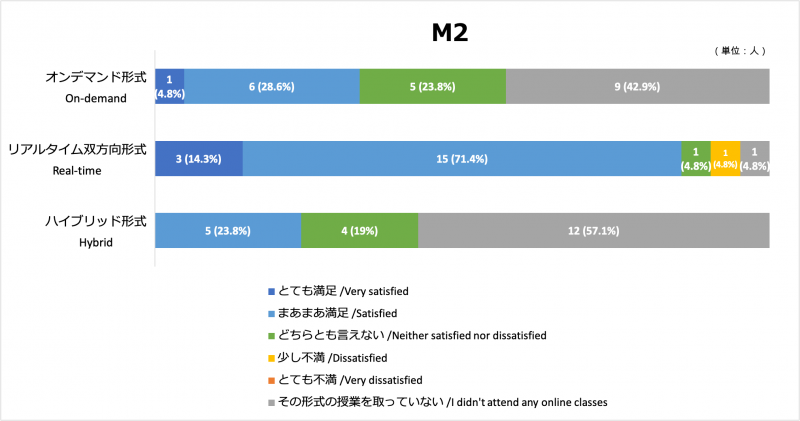 オンライン授業について、M1の回答者の間ではオンデマンド形式、リアルタイム双方向形式ともに総じて満足度は高かったようです。ハイブリッド形式授業は経験しなかった方が34人中11名いましたが、経験者にはオンデマンドやリアルタイムほどではないものの、一定の評価を得たようです。
オンライン授業について、M1の回答者の間ではオンデマンド形式、リアルタイム双方向形式ともに総じて満足度は高かったようです。ハイブリッド形式授業は経験しなかった方が34人中11名いましたが、経験者にはオンデマンドやリアルタイムほどではないものの、一定の評価を得たようです。
一方、M2は回答者の半数近くがオンデマンド形式の授業をとっていませんでしたが、経験した方はM1同様、オンデマンドも、またリアルタイム双方向形式ともに総じて満足度は高かったようです。ハイブリッド形式授業も半数以上の12名が経験していませんでしたが、経験した方からはまあまあの評価を得たようです。
When asked about their level of satisfaction toward the online classes, a majority of M1 respondents said they were satisfied with the on-demand and real-time classes. Nearly half of them did not participate in hybrid classes, but those who did expressed content.
As for second year students, nearly half of them did not take any on-demand lecture classes in 2020. Among those who did, most were generally satisfied. A good majority were also satisfied with the real-time classes. Nearly half did not take part in hybrid classes, but those who did were generally satisfied.
Q2: 今年度、ゼミはどのような形式で行われましたか?/How were the seminars held this year?
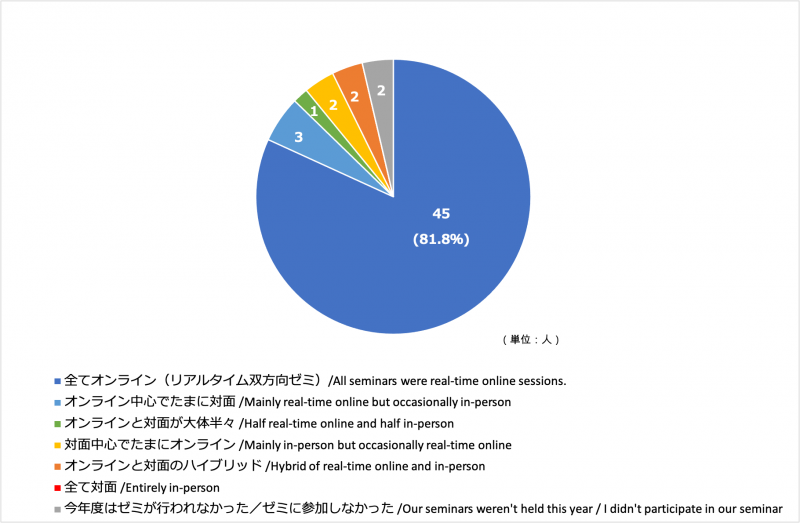
2020年度のゼミについては、全回答の約81.8%がリアルタイム双方向形式のオンラインゼミを受けました。少数ですが、対面の機会を時々もうけたゼミやハイブリッド開催のゼミもあったようです。
In relation to seminars, 81.8% percent of all respondents said their seminars were held entirely online this year. A minority of respondents experienced seminars which had occasional in-person or hybrid style sessions.
Q3: オンライン授業/ゼミは主にどこで受けましたか?1つだけ選んでください。/Where did you mainly take the online classes and seminars? Please check only one.
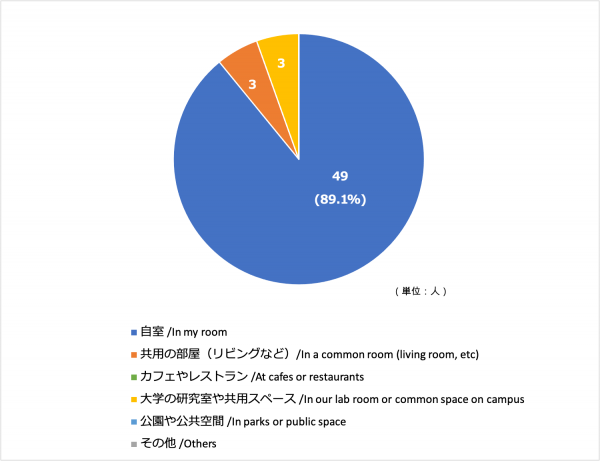
オンライン授業やゼミは全回答者の89.1%が自室で受講しました。共用の部屋や大学の研究室や共用スペースで受講した方もいました。
A total of 89.1% of all respondents attended classes and seminars from their own rooms, while a few connected from common rooms in their home, lab rooms or common spaces on campus.
Q4: オンライン授業/ゼミはどのような点を評価していますか?(複数回答可)/ What do you think are the positive aspects of online classes and seminars? (Multiple choice)
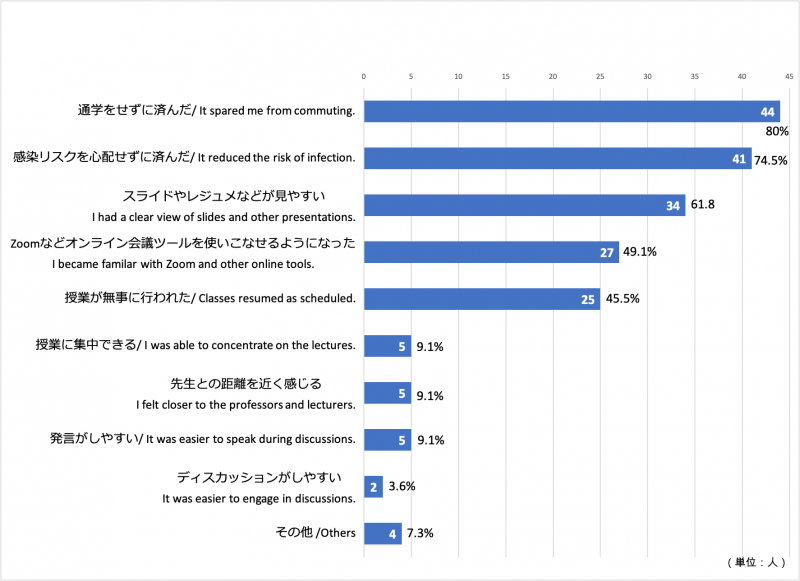
オンライン授業やゼミの評価としては「通学をせずに済んだ」(80%)「感染リスクを心配せずに済んだ」(74.5%)「スライドやレジュメが見やすい」(61.8%)ことへの評価は高かったです。また「オンライン会議ツールを使いこなせるようになった」(49.1%)「授業が無事に行われた」(45.5%)ことも比較的ポジティブに受け止められました。少数意見として「録画が配布される場合、あとで復習しやすい」ことや「録画を倍速で見ることができて時間効率がよかった」などもありました。
In a multiple-choice question asking about the positive aspects of online classes and seminars, “It spared me from commuting” was chosen by 80% of all respondents, followed by “It reduced the risk of infection” at 74.5%, and another 61.8% said they evaluated the “clear view of the slides and presentations.” Meanwhile, 49.1% also said they were now comfortable with using online meeting tools like Zoom, and another 45.5% also gave credit to the fact that classes resumed as scheduled. A minority of respondents chose “When recordings of the classes were accessible, it was good as I could review it afterwards.” and “It was convenient to be able to fast-forward the recordings as I went over the lecture.”
Q5: オンライン授業/ゼミの難しさを感じる点はなんですか?(複数回答可)/What do you think are the downside of online classes and seminars? (multiple choice)
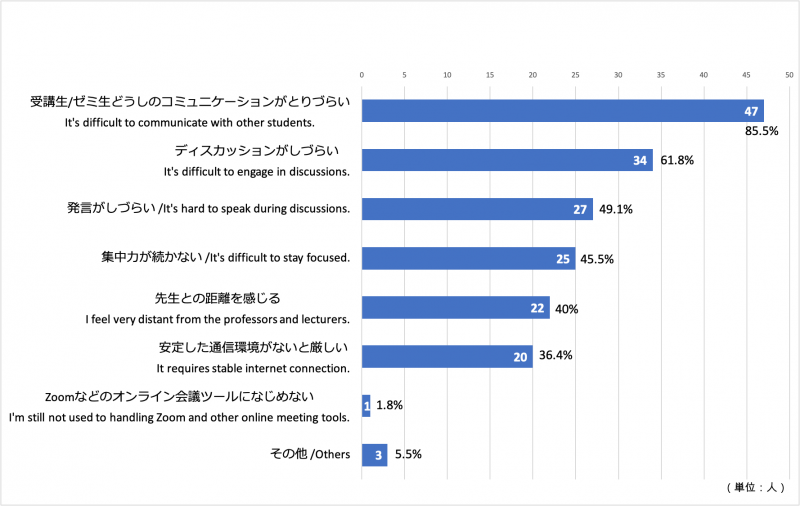
一方、オンライン授業やゼミの難しさについては「受講生、ゼミ生どうしのコミュニケーションが取りづらい」(85.5%), 「ディスカッションがしづらい」(61.8%), 「発言がしづらい」(49.1%)といった、学びの仲間とのコミュニケーションのしづらさに多くの回答が集まりました。「集中力が続かない」(45.5%)ことを感じた人も。「先生との距離を感じる」(40%)は全体の割合ですが、M1のみの回答では52.9%、M2のみの回答では19%と出ており、パンデミック前に既に関係が築けているM2とM1の違いが見られました。「安定した通信環境がないと厳しい」(36.4%)も一定数の方が感じたようです。
In another multiple-choice question regarding the downside of online classes, 85.5% said it was difficult to communicate with other students, while 61.8% also said online settings made it difficult to engage in discussions. Another 49.1% also found it challenging to find the right timing to speak. Some 45.5% also said they found it difficult to stay focused. A total of 40% of all respondents said they felt distant from the professors, but M1 students had a higher rate than M2 students (52.9% among M1 and 19% among M2). Some 36.4% also said online classes required a stable internet connection.
Q6: 対面授業が復活したのちでも、続いてほしいオンライン授業/ゼミの形式はどれですか?/What types of online classes/seminars would you like to see continue even after in-person classes/seminars?
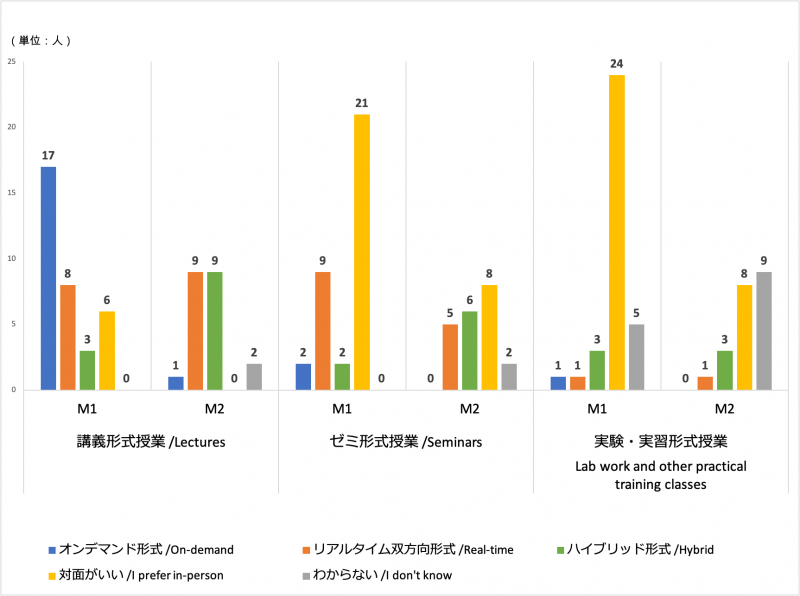
対面の授業が復活したのちにも続いてほしいオンライン授業の形式については、M1からは講義形式授業では引き続きオンデマンド配信は続いてほしいという声が一番大きく(17人)、続いてリアルタイム双方向形式(8人)が支持されました。しかしゼミ形式の授業はリアルタイム双方向形式に多少支持はあったものの(9人)、対面がよいという答えがその2倍以上の21人でした。実験・実習形式の授業は圧倒的に対面がよいという回答でした(24人)。
一方、昨年度対面授業を経験したM2の回答者からは、講義形式授業ではリアルタイム双方向形式やハイブリッド形式が続いてほしいとの回答が9人ずつありました。ゼミ形式の授業は対面がもっとも支持され(8人)、ハイブリッド(6人)、リアルタイム双方向形式(5人)と続きました。実験・実習形式の授業は、わからないを除いては、対面が一番支持を得ました。(わからないが一番多かったのは、理系ではない方だったのではないかと思われます。)
Even after in-person classes/seminars resume, a total of 17 among the first year respondents said they would like to see on-demand classes continue for lectures, followed by real-time online sessions, which gained the support of 8 people. For seminars, 9 people supported the continuation of real-time online sessions, but 21 people said they prefer in-person sessions. For lab work and other practical training sessions, 24 people said they prefer in-person to online.
Meanwhile, among the M2 respondents, on-demand and real time online classes for lectures were each supported by 9 respondents. As for seminars, 8 supported in-person classes, while 6 voted for hybrid classes and 5 people said they hope to see real-time online seminars continue. Regarding lab work and other practical training classes, 8 people preferred to attend them in-person only. (Apparently, respondents may not be from courses where lab work and practical trainings are part of their research, which may be the reason why 9 people responded “I don’t know” for this last question.)
Q7: オンライン授業/ゼミについてさらに意見があれば自由に述べてください。/Please share any other thoughts regarding online classes and seminars.
オンライン授業やゼミへの自由回答には「孤立しやすくなる」「新しい人間関係を作りにくい」など先生や他の学生とのコミュニケーションのとりづらさが複数の方より述べられました。また、講義形式の授業の録画のアーカイブ化を望む声や、動画の長さや授業の運営への注文もありました。少人数の授業は対面で行うことを望む声も聞かれました。M2からは中間発表時に生じた通信障害をみて、オンライン会議ツールを媒介させる難しさを感じたという声もありました。
When asked for opinions about online classes and seminars, multiple respondents said they felt alone and isolated, expressing difficulty in communicating with other students and professors, or making new friends. Some asked for classes with a small number of students to resume in-person, while others requested the recordings of the classes to be archived so that they can watch them afterwards. One of the M2 respondents touched on connectivity issues that he or she experienced during the mid-term presentation.
大学生活について About campus life
要旨・Gist of the findings:
- 1年を通じてキャンパスにはほとんど行かなかった人が多い。
- S1/S2タームに比べてA1/A2タームは行く機会が少し増えた傾向にあった。M1は「学籍など事務的な手続き」、M2は「資料収集」が一番の理由。
- 回答者の半分以上は所属研究室の仲間や先生と対面で交流する機会はなかった。対面で会えた人はゼミや研究指導、お茶や歓談など。
- M1は研究室にはそれなりに親しみを感じられたものの、学環・学府に対しては普通かそれ以下の親しみしか覚えることができていない人が多い。M2では2019年度と比べて研究室への親しみは変わらないか少し弱まった傾向が見られ、学環・学府への親しみはそれ以上に弱まった傾向が浮かび上がった。M1/M2ともに、80%以上がこの結果にはCOVID-19の影響があると答えた。
- A majority of M1/M2 students did not come to campus this year
- Most stayed off campus during S1/S2 terms, but A1/A2 terms saw some return to campus. Visits were mainly for administrative purposes for M1 students, and borrowing books for M2 students.
- A majority of respondents did not meet professors and colleagues from their lab in person this year.
- If/when they did meet in person, it was for in-person seminars, research meetings, and chats over tea or coffee.
- M1 students have generally built their sense of attachment to their labs, but not as much toward the III/GSII. For M2 students, the sense of attachment to their labs did not change greatly or saw a slight downward trend. Meanwhile, their attachment towards the III/GSII had weakened in 2020 when compared to 2019. Over 80 percent of M1 and M2 students said the pandemic had influenced their sense of attachment.
Q8: 今年度、キャンパスにはどれぐらい行きましたか?タームごとに教えてください。(東大のキャンパスすべて対象)/How often did you come to campus this year? Please respond separately for each term. (Please include visits to any of the Todai campuses.)
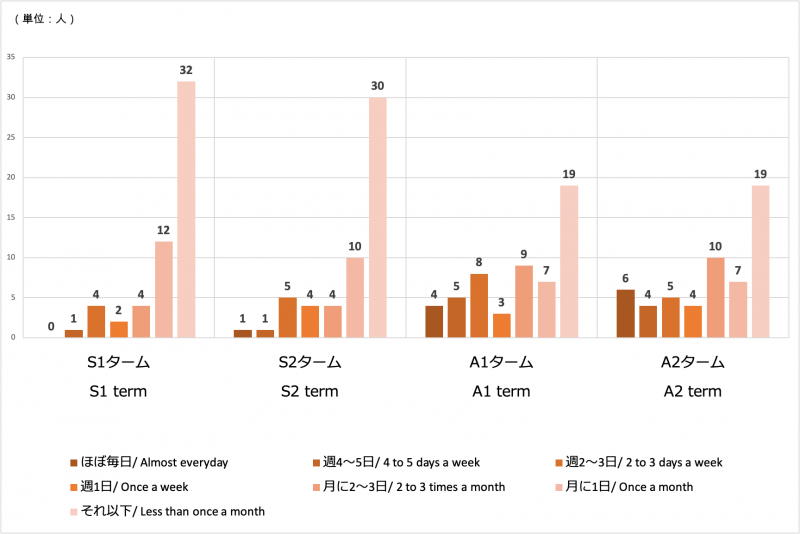
S1/S2タームは、4-5月の緊急事態宣言中にキャンパスが封鎖された期間以降もほとんどの方が来ていなかった傾向が続きました。A1/A2タームも引き続きキャンパスにはほぼ行かなかった人がもっとも多かったものの、S1/S2に比べて少しずつキャンパスに来る人が増えた傾向が見られました。
Respondents generally have stayed off campus, especially during the S1 and S2 terms. Some students started going to campus in A1 and A2 semesters, but on limited occasions.
Q9: キャンパスに行った場合、その目的はなんでしたか? (複数回答可) /What was the purpose of your visit to the campuses? (multiple choice)
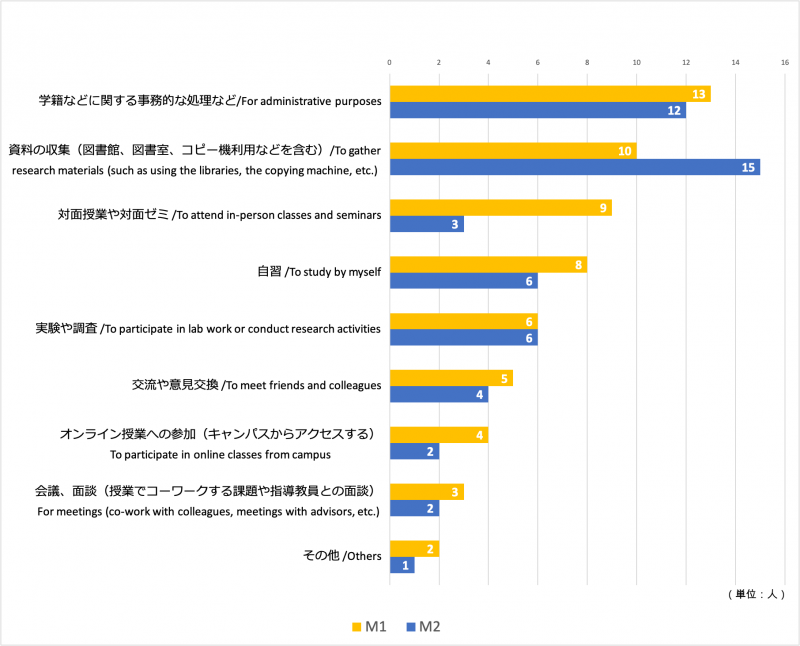
キャンパスに行った時の目的は、M1では「学籍などに関する事務的な処理など」が最も多く(13人)、「資料の収集」(10人)「対面授業やゼミへの参加」(9人)そして「自習」(8人)と続きました。一方、修論を執筆中であったM2にとって、コロナ禍でキャンパスに行った時の目的は「資料の収集」が(15人)と最も多く、「学籍などに関する事務的な処理など」(12人)、「実験や調査」「自習」(それぞれ6人)と続きました。
In a multiple-response question regarding the purpose of campus visits, the most frequent response among M1 students was administrative issues with 13 persons, followed by visits to gather research materials with 10 people. Another 9 people said they went to attend in-person seminars/classes, while 8 people said they went to study on their own.
Meanwhile, the most frequent reason for M2 students was to “gather research materials” with 15 people, followed by “administrative issues” with 12 people. Lab work or data collection, as well as study on one’s own followed, each gathering 6 persons.
Q10: 所属研究室の仲間や先生と直接会って交流する機会はありましたか?(複数回答可)/Did you have any chance to meet with your professors and colleagues from the lab?
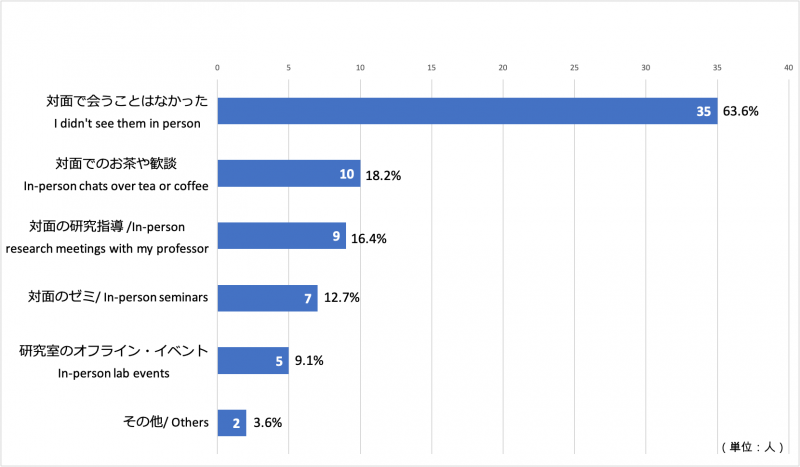
この1年、研究室の仲間や先生とは全回答者の63.6%が対面で会うことがなかったようです。対面で会えた時の交流の機会は「お茶や歓談」(18.2%)や「研究指導」(16.4%)、また「対面でのゼミ」(12.7%)や「研究室のオフライン・イベント」(9.1%)などでした。
In a multiple-choice question regarding opportunities to meet in-person with professors and colleagues from the lab, 63.6% of all the respondents said they had no such opportunities during the year. Among the respondents who did, 18.2 percent said they engaged in chats over tea or coffee, another 16.4% had research meetings with advisors. Another 12.7% went to attend in-person seminars while 9.1 percent saw professors or colleagues at lab events.
Q11-①:(M1へ)研究室および学環・学府に感じる親しみについて教えてください。/(To M1) How do you evaluate your sense of attachment to your lab and to the III/GSII?
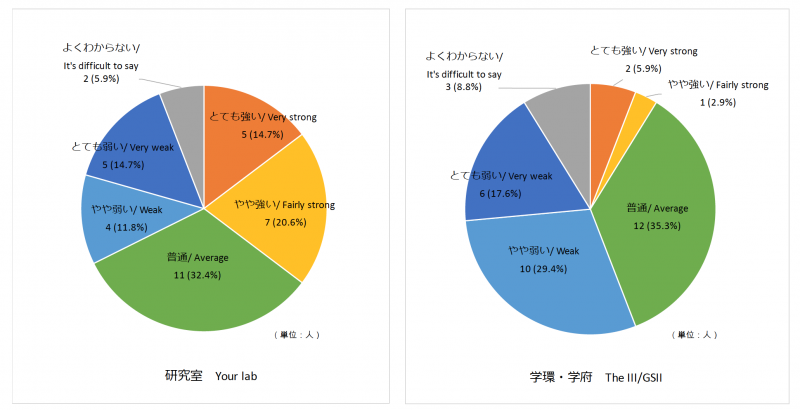
コロナ禍で学府生活をスタートさせたM1の研究室や学府への親しみを伺ったところ、研究室に対しては「普通」(11人)を中心にある程度所属感を抱いた(とても強い5人、やや強い7人)一方で、学環・学府全体に対しては「普通」(12人)を中心に必ずしもそうとは言えない(やや弱い10人、とても弱い6人)傾向が浮かび上がりました。
When asked about their sense of attachment toward their labs, 11 among the M1 respondents chose “average”, while five said their attachment was “very strong” and seven chose “fairly strong”. Regarding their sense of attachment to the III/GSII, a total of 12 respondents said it was about “average”, but the rest showed a downward trend, with 10 respondents choosing “weak”, and another six people choosing “very weak”.
Q11-②:(M2へ)2019年度と比べて、研究室および学環・学府に感じる親しみの程度に変化はありますか?/ (To M2) How is your sense of attachment to your lab and to the III/GSII compared to the academic year 2019?
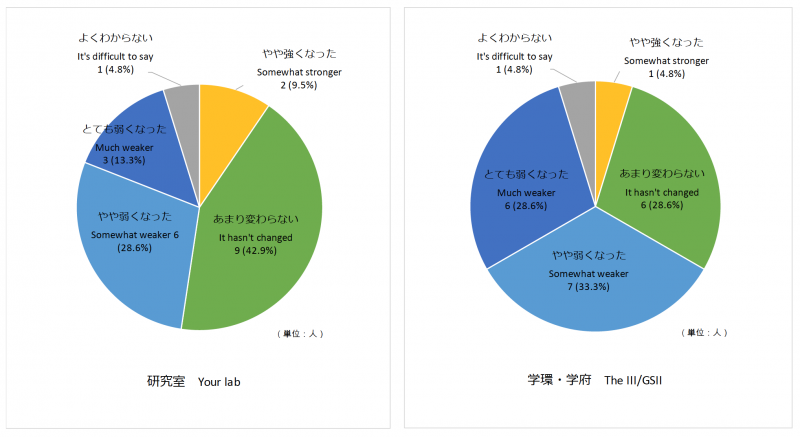
M2に2019年度と比べての研究室や学府への親しみを伺ったところ、研究室に対しては「あまり変わらない」(9人)が最も多く、「やや弱くなった」(6人)「とても弱くなった」(3人)との答えが続きました。一方で、学環・学府全体に対しては「やや弱くなった」(7人)が最も多く、「変わらない」「とても弱くなった」と答えた人が6人ずついました。親しみの程度は下がった傾向が浮かび上がりました。
In comparison with the academic year 2019, nine of the M2 respondents said their sense of attachment towards their labs “hasn’t changed”, while six said it was “somewhat weaker” and three said “much weaker”. In terms of their sense of attachment to the GSII, there was an even greater downward trend: six people said “it hasn’t changed”, while seven said it has become “somewhat weaker” and another six chose “much weaker”.
Q12: Q11への答えにコロナの影響はあると思いますか?/Do you think the pandemic influences your response to Q11?
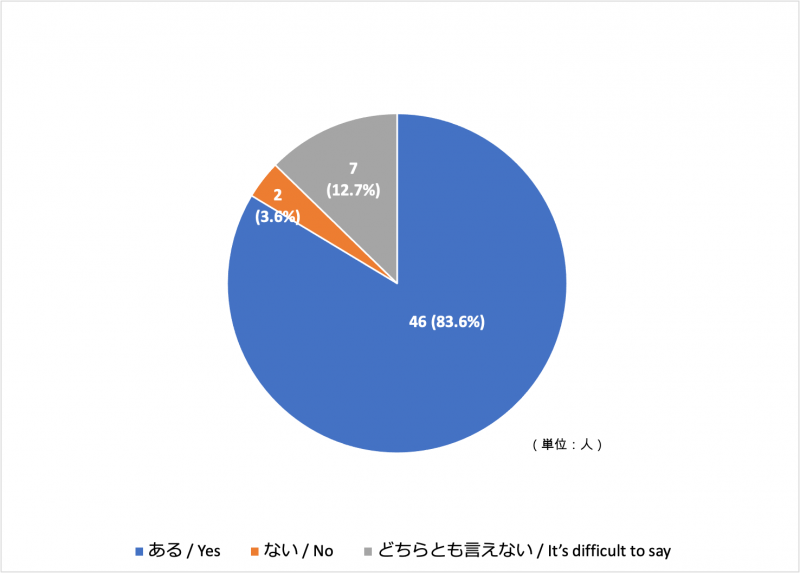
Q11の答えについて、理由はコロナにあると全回答者の83.6%の方が感じていると答えました。
Some 83.6 percent said the pandemic influenced their response to the previous question.
アンケート後編は「研究・修論・進路について」「日常生活について」の結果です。Part 2 will show results on ” research/master’s thesis/future plans” and on “everyday life.”
企画: ニューズレター&ウェブ編集部 / Organized by the Newsletter & website editorial team
構成・グラフ:金佳榮(特任研究員)/ Editing & Diagrams: Kayoung Kim (Project researcher)
構成・記事:神谷説子(特任助教)/ Editing & Text: Setsuko Kamiya (Project assistant professor)
英語校正:デービッド・ビュースト(特別専門員)/ English copyediting: David Buist (Senior project specialist)

